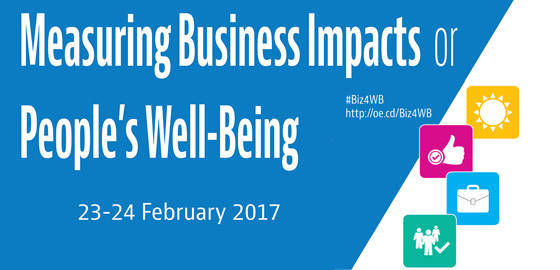Expanding Well-Being and Business: A Question of Do or Die?
Over 200 people have enrolled in a groundbreaking workshop hosted by the OECD to discuss well-being in and around firms. At the heart of the event spread over two days is the central question: how can we accurately measure what is recognized as a growing business, societal and political phenomenon? HEC Paris and its SnO Center is to send a strong delegation of speakers, students and observers to join representatives from the civil society, Fordham University and the host organization. Together, they hope to stimulate the creation of new tools for measuring, and thus improving, well-being that business can procure to people.

Two Days to Harmonize Well-Being Indicators
“We hope this workshop will harness public policy to a renewed vision of the impact companies have on our shared heritage, on our Earth and on human-driven businesses.” SnO Academic Director Rodolphe Durand thus sums up his Center’s commitment to February’s two-day gathering in the OECD Conference Center in Paris’ 16th arrondissement. The author of The Disorganization of the World is to help introduce the program on February 23 in what organizers hope will be an effective brainstorming exchange spread over three keynote sessions and three workshops. “The aim,” explains OECD’s Chief Statistician and Director of Statistics, Martine Durand, “is to work with the business community to co-develop and compile consistent indicators.” These, she hopes, will “contribute to inform business strategies, financial investors’ decisions as well as consumers’ behaviors.”
Top Speakers Compare Tools to Measure Well-Being
Key guests over the two days include HEC Emeritus Professor Georges Blanc (specialized in Strategy and Business Policy), Danone CEO Emmanuel Faber, Aaron Pereira of The Well-being Project, HEC Paris Professor Frédéric Dalsace, Unilever’s European Well-being strategist Marcus Hunt, Oxfam researcher Irene Guijt and author Malene Rydahl. Along with the 177 other guests, they will be attending four sessions on the following themes: well-being as a business concept; how well-being can translate into success-stories in business; the challenges in finding ways to leverage business practices on well-being; and what new methodologies and tools are needed to better measure well-being. The sessions are followed by three workshops on the usage of business impacts metrics and well-being metrics by companies, as well as the use of such metrics by consumers and society.
Combining Well-Being With Business Prerogatives
Speakers at the workshop recognize that traditional measures of economic and financial profitability are not sufficient to measure the scope of business performance. According to the organizers, they need to be broadened to include impacts on companies’ entire ecosystem, “spanning from ecological to social and ethical.”“As a business school,” insists Rodolphe Durand, “HEC Paris believes it can go much further and answer other questions such as: what should we mold capitalism for tomorrow? With which organizations? For which kind of well-being?” The world’s business community is well aware of the crucial nature of such questions, according to a 2013 PwC survey. This claims that over 90% of CEOs agree that measuring total impact “would help their businesses to identify and manage their risks more effectively.” And more than 80% believe new measurements would “identify new business opportunities.”
Standardizing Impact Indicators for the Common Good
This realization has gone right to the top of the business world. A week before the OECD workshop, for example, Emmanuel Faber declared in Les Echos that the global model is no longer applicable to business and new forms of localized, transparent and equitable companies must replace the old paradigms. “Consumers want to know how the business community works, what their values are,” Faber is quoted as saying.
Such values will be at the heart of debates during the Paris workshops taking place all day Thursday and Friday morning.“Businesses have a profound influence on people’s well-being,” notes Romina Boarini, the OECD Deputy Head of the Household Statistics and Progress Measurement Division. “But to better understand this impact and ensure that the business sector and policy-makers pursue consistent goals, it is important to harmonize and align their respective metrics and benchmarking systems to a greater extent.” Calculating social impact, according to Rodolphe Durand, does remain “in its infancy,” however. Ironically, the SnO Professor pursues, it is the abundance of criteria and specific methods which prevent a convergence and compatibility in evaluating the strategy and actions used by businesses. “The standardization of social impact indicators is therefore at stake, it is a crucial step to take by economic actors be they profit or nonprofit organizations.”